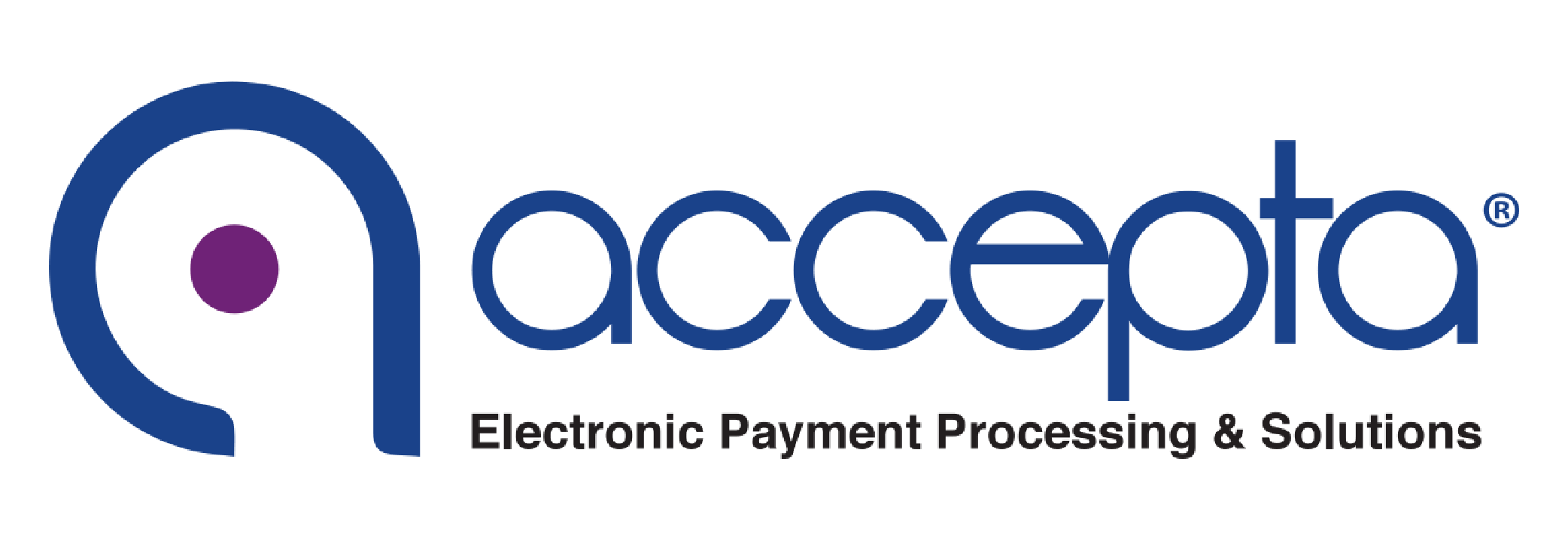The most frequently asked questions about payment processing are available for you to get a better understanding of our process. We want you to ask questions so that you feel safe that your information is secure, that our company is reliable and that we understand how valuable your time is.
Credit Card Processing
A merchant account is an agreement between your company and an acquiring entity which entitles you to accept credit card payments. A merchant account is required to accept credit card payments.
Yes, Accepta can help you find and implement the best value offer on merchant services.
You will be able to accept all major credit cards: Visa, MasterCard, Discover, UnionPay, Diners Club and associated brands, American Express and debit cards.
If you have a store front, mobile, or accept walk-in payments; yes. You do not need a card terminal or “swipe device” if you process payments through a webpage (shopping cart), over the phone or monthly subscription plans.
In order to begin accepting credit card payments you will need a merchant account, a payment capture device, and/or a payment interface.
Qualified rates are for qualified transactions, which are generally referred to card present transactions. “Card present” really means that you physically saw/swipe the card on device.
Non-qualified rate applies to transactions that involve internationally issued cards (where card issuing entity is located outside the merchant account country or region), corporate, and rewards credit cards. There are also specialized transactions like eCommerce and over the phone (IVR), that fall into non-qualified rates (a.k.a. card not present transactions).
Non-qualified rate applies to transactions that involve internationally issued cards (where card issuing entity is located outside the merchant account country or region), corporate, and rewards credit cards. There are also specialized transactions like eCommerce and over the phone (IVR), that fall into non-qualified rates (a.k.a. card not present transactions).
Monthly fees are the flat amount a merchant pays to keep the merchant account open. This is generally around $10 per month.
A monthly minimum fee is similar to a monthly fee. It ensures there is minimum activity in the merchant account. Merchants pay a minimum amount per month, even if they do no transactions. However, if the merchant does do a certain level of transaction the monthly fee disappears.
A monthly minimum fee is similar to a monthly fee. It ensures there is minimum activity in the merchant account. Merchants pay a minimum amount per month, even if they do no transactions. However, if the merchant does do a certain level of transaction the monthly fee disappears.
ACH Processing
ACH stands for Automated Clearing House. An ACH transaction is an electronic money transfer between participating financial institutions.
The automatic clearing house network (ACH Network) is processing and delivery system that provides for distribution and settlement of electronic credits and debits among financial institutions.
Common applications include direct deposit for payroll and direct debit for automated loan payments, etc.
In 2000, the ACH began releasing a wave of new applications collectively referred to as “e-check” applications. These applications make it possible to accept payments by phone, online, and even the conversion of mailed in checks to electronic items.
Another variant of ACH transactions are “Same Day ACH” where payments and settlement are initiated and settled the same day. Also, “Real Time Payments” transactions might be also available, where payments are initiated and settled almost instantaneously.
The automatic clearing house network (ACH Network) is processing and delivery system that provides for distribution and settlement of electronic credits and debits among financial institutions.
Common applications include direct deposit for payroll and direct debit for automated loan payments, etc.
In 2000, the ACH began releasing a wave of new applications collectively referred to as “e-check” applications. These applications make it possible to accept payments by phone, online, and even the conversion of mailed in checks to electronic items.
Another variant of ACH transactions are “Same Day ACH” where payments and settlement are initiated and settled the same day. Also, “Real Time Payments” transactions might be also available, where payments are initiated and settled almost instantaneously.
Yes, most businesses can benefit from ACH processing. If your business requires to bill for a service or are generating payments to other entities or persons you can benefit from ACH transactions.
ACH will allow you to accept payments via the phone, online, and convert traditional checks received into electronic items.
ACH will allow you to accept payments via the phone, online, and convert traditional checks received into electronic items.
There are many advantages to ACH payments – faster settlement timeframes, shorter return notification windows and automated return re-submission. This coupled with a low cost per item in comparison to other payment systems such as wire transfers and credit cards make it an attractive payment system for many businesses.
ACH transactions have the lowest cost associated with any payments system.
An ACH payment is typically more secure than sending money by other means. This is because the ACH Network that this transaction passes through is completely automated and in order for the transaction to be processed, all of the banking information has to be completely verified and authorized, and they need to abide by the Operating Rules.
ACH transactions have the lowest cost associated with any payments system.
An ACH payment is typically more secure than sending money by other means. This is because the ACH Network that this transaction passes through is completely automated and in order for the transaction to be processed, all of the banking information has to be completely verified and authorized, and they need to abide by the Operating Rules.
Funds are usually settled in 3 – 5 days through a regular ACH transaction.
Online Payment Gateways
A payment gateway is a technology application/service offered by a payment processing service provider for accepting electronic payments.
Its primary function is to securely receive and process payments such as debit cards, credit cards, or ACH Payments. Payment gateways allow merchants to receive payments online, by phone, or integrated API.
Its primary function is to securely receive and process payments such as debit cards, credit cards, or ACH Payments. Payment gateways allow merchants to receive payments online, by phone, or integrated API.
Today, online sales are more than typical – they’re expected. Today’s consumers are combining their online shopping with other channels.
The majority—73%—are omni-commerce shoppers whose buying journey encompasses online, in-store, and even direct mail experiences.
The majority—73%—are omni-commerce shoppers whose buying journey encompasses online, in-store, and even direct mail experiences.
Yes, although ACH and credit card payments rely on different settlement networks, you can funnel all payment activities through a single gateway regardless of activity type.
When a customer enters their payment information in the payment application (online, over the phone, or other integrated software), the gateway requests payment from the customer’s issuing bank verifying both the accuracy of the account data and availability of funds.
Once the information is validated, the gateway sends requests for the funds transfer, deposits the payment, and sends the transaction details to your merchant account. All of this takes place instantly and is completed in a matter of seconds.
Once the information is validated, the gateway sends requests for the funds transfer, deposits the payment, and sends the transaction details to your merchant account. All of this takes place instantly and is completed in a matter of seconds.
Technology
A POS, or point-of-sale, is a combination of hardware and software system that allows business owners to manage the day-to-day operations of their business, complete transactions, and take in data for analytics and reporting purposes.
EMV, short for EuroPay, is a technical standard for smart payment cards and for payment terminals and automated teller machines which can accept them.
EMV cards are smart cards (also called chip cards or IC cards) which store their data on integrated circuits rather than magnetic stripes, although many EMV cards also have stripes for backward compatibility.
EMV cards are smart cards (also called chip cards or IC cards) which store their data on integrated circuits rather than magnetic stripes, although many EMV cards also have stripes for backward compatibility.
A virtual terminal is a secure web-based interface that allows a merchant to process credit/debit card, ACH and check payments from any device that has an Internet connection.
Chargebacks
A chargeback is when a cardholder disputes a transaction, they do not recognize or believe was done in error.
The most common claims for chargebacks are:
- Incorrect amount charged to the cardholder.
- Item not received.
- Items or services not as described.
- The chargeback system is run by the card brands (Visa, MasterCard, Discover, American Express, etc.).
If you receive a chargeback notification in the mail, please respond as quickly as possible. There are time limitations and if the response date has passed, you may be left with little recourse to dispute the chargeback.
The most common claims for chargebacks are:
- Incorrect amount charged to the cardholder.
- Item not received.
- Items or services not as described.
- The chargeback system is run by the card brands (Visa, MasterCard, Discover, American Express, etc.).
If you receive a chargeback notification in the mail, please respond as quickly as possible. There are time limitations and if the response date has passed, you may be left with little recourse to dispute the chargeback.
The dispute management process is handled through an online portal that lets you take immediate steps to review, respond, and monitor chargebacks.
The tool eliminates the need for paperwork to be mailed or faxed, which leads to easier and more efficient resolutions.
The tool eliminates the need for paperwork to be mailed or faxed, which leads to easier and more efficient resolutions.
Privacy, Security, and Compliance
The Payment Card Industry Data Security Standard (PCI DSS) is a set of requirements intended to ensure that all companies that process, store, or transmit credit card information maintain a secure environment.
It was launched on September 7, 2006, to manage PCI security standards and improve account security throughout the transaction process.
An independent body created by Visa, MasterCard, American Express, Discover, and JCB, the PCI Security Standards Council (PCI SSC) administers and manages the PCI DSS.
It was launched on September 7, 2006, to manage PCI security standards and improve account security throughout the transaction process.
An independent body created by Visa, MasterCard, American Express, Discover, and JCB, the PCI Security Standards Council (PCI SSC) administers and manages the PCI DSS.
Yes, Accepta is PCI-DSS Level 1 certified
Level 1: Merchants that process over 6 million card transactions annually.
Level 2: Merchants that process 1 to 6 million transactions annually.
Level 3: Merchants that process 20,000 to 1 million transactions annually.
Level 4: Merchants that process fewer than 20,000 transactions annually.
Level 2: Merchants that process 1 to 6 million transactions annually.
Level 3: Merchants that process 20,000 to 1 million transactions annually.
Level 4: Merchants that process fewer than 20,000 transactions annually.



